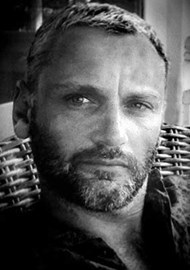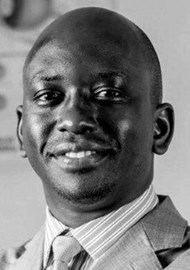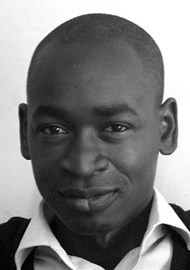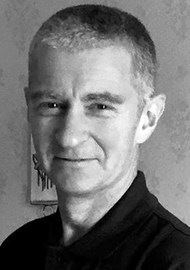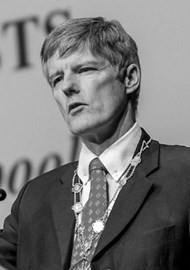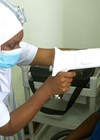Eye health problems and access to diagnosis and treatment is an important issue throughout low- and middle-income countries (LMICs), and particularly on the African continent, where quality of life is drastically affected by poor vision, blindness and deteriorating eye health, especially for those living in poverty.
Now approaching its first decade in existence, the College of Ophthalmology of Eastern, Central and Southern Africa (COECSA) has worked towards raising standards of knowledge and practice in the region. Since 2008 it has been in a VISION 2020 LINK partnership with the Royal College of Ophthalmologists (RCOphth), including its earlier existence as the Eastern Africa College of Ophthalmologists (EACO).
In 2008, the goals of the LINK partnership were to enhance ophthalmology training infrastructure in East Africa through:
- developing Fellowship examinations
- standardising the curriculum in training colleges in Tanzania, Kenya and Uganda
- developing continuing professional development (CPD)
- developing subspecialty training in the region
The goals of the LINK partnership are in parallel with the third Sustainable Development Goal [1] – good health and well-being. The intention of the LINK has always been to help COECSA realise its full potential to co-ordinate high quality training in the region and oversee the highest standards of practice [2]. One of the key components of the LINK partnership has been the development of the COECSA Fellowship exam, combined with examiner training to ensure the sustainability of this project outcome.
“Ultimately, leaving no- one behind requires the transformation of deeply rooted systems, economic, social and political, governance structures and business models at all levels, from local to global.”
Successful candidates are conferred the title ‘Fellow of the College of Ophthalmology of Eastern, Central and Southern Africa’, a qualification that is recognised in all the countries that COECSA encompasses. These are Kenya, Uganda, Tanzania, Malawi, South Sudan, Ethiopia, Rwanda, Burundi and Zambia.
United Nations: leaving no-one behind
“As we embark on this great collective journey, we pledge that no-one will be left behind. Recognising that the dignity of the human person is fundamental, we wish to see the goals and targets met for all nations and peoples and for all segments of society. And we will endeavour to reach the furthest behind first.”
Transforming our world: the 2030 Agenda for Sustainable Development UN General Assembly 25 September 2015.
By adopting the 2030 Agenda, Member States have committed to leave no-one behind in their implementation of the Sustainable Development Goals (SDGs) [3]. This means that the specific needs of vulnerable countries, including African countries, least developed countries, landlocked developing countries, small island developing states, countries in situations of conflict and post-conflict countries, need to be addressed, so that each of them can enjoy sustained, inclusive and sustainable economic growth and social progress.
Within countries, all people, regardless of their backgrounds, have rights and responsibilities to fulfil their potential in life, and lead decent, dignified and rewarding lives in a healthy environment. This means that goals and targets need to be met for all segments of society. Those often left behind are people living in poverty and other vulnerable situations, including children, youth, persons with disabilities, people living with HIV / AIDS, older persons, indigenous peoples, refugees and internally displaced persons and migrants. Their voices must be heard, and their active participation as agents of change needs to be promoted.
Despite progress in reducing poverty and inequalities, and improving health and education in relatively short periods of time, significant disparities remain across regions and within countries. If the current global trends persist, humanity will miss out on its 2030 deadline for eradicating poverty. Universal access to quality primary and secondary education and universal health coverage is also unlikely to be achieved at the current rate of progress. Not only are people and countries being left behind, but they risk being pushed further behind by a variety of forces, including globalisation, technological advances, the negative impacts of climate change and other forms of environmental degradation.
To achieve the objectives of the 2030 Agenda, we need holistic and coherent cross-sectoral policies supported by disaggregated data and evidence-based policymaking. We need to identify those who are left behind and the circumstances that prevent their full participation in the benefits of development.
To achieve that, we will need, among others, integrated social policy frameworks that aim to progressively achieve universal coverage, while addressing the specific needs of vulnerable people through targeted policies and programmes; macroeconomic and fiscal instruments that promote inclusive growth, decent work for all, and the reduction of inequalities.
Ultimately, leaving no one behind requires the transformation of deeply rooted systems, economic, social and political, governance structures and business models at all levels, from local to global.
Development of the COECSA Fellowship exam
The COECSA Fellowship exam has gone from strength to strength since it started in 2010. It is taken by ophthalmologists in addition to their own training institution Master of Medicine (MMed) degree.
The Fellowship exam has attracted an increasing number of candidates each year and the cumulative total is now 134.
The COECSA Fellowship examination is modelled on the FRCOphth Part 2 Oral examination. The exam comprises structured vivas and OSCE elements, taken over two consecutive days. Through the VISION 2020 LINKS Programme, and with College input, the COECSA Fellowship examination has developed and matured. Full details of the components of the Fellowship exam are available on the COECSA website [4].
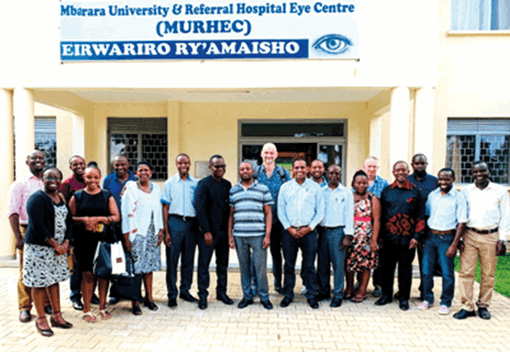
2018 COECSA Fellowship examiners, trainers and secretariat
at Mbarara University and Referral Hospital Eye Centre.
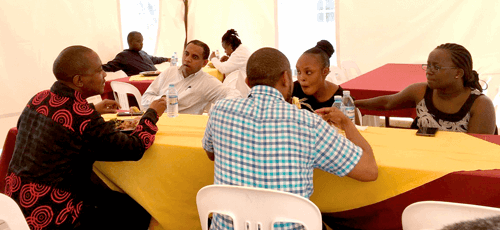
Fellowship exam candidates relaxing between sessions.
Over the years the preparation and organisation involved in delivering a robust exam, including patient selection, time management, standardised questions and marking schemes have all been enhanced. The aim of any exam is to assess the standard of the individual candidate, to protect the public against poorly performing doctors, and drive learning. Any exam is a product of three components – validity, reliability and feasibility – and this is echoed strongly in the COECSA Fellowship examination as it has built upon its foundations to become an established qualification in ophthalmology in Africa.
The Royal College of Ophthalmologists has been supporting COECSA’s work through a formal LINKS Partnership since 2008. Many UK ophthalmologists have participated. I know that their contributions have been greatly appreciated by their African counterparts. In 2008 we ran a seminar in Nairobi on how to examine. At that time, it was clear that if all the countries represented were going to be able to deliver the same standard of training they would need to unite behind an internationally recognised examination. And the COECSA ophthalmologists have more than met the challenge together with the input of our own Examinations Team here. Since then, I had the opportunity to act as an External Examiner when the COECSA examination was held in Ethiopia a few years ago, and I witnessed first-hand the quality of both the examiners and the candidates.
The College of Ophthalmology of East Central and Southern Africa (COECSA) is an excellent example of the benefits of international cooperation. Colleagues from nine countries have pooled their resources to address the shortage of ophthalmologists in their region and to improve the standards of eye care delivered. On behalf of those of us who have been involved with this work, I would like to congratulate the COESCA Examinations Committee for all that it has achieved so far, and I look forward to working with them in future.
Michael Burdon, President, Royal College of Ophthalmologists
I have been the head of the COECSA Fellowship exam for the past two years, and assisted with the running of the exams from 2013. Over the years we have seen tremendous change – having had only two candidates at the first exam in 2010, we had 27 candidates in the just concluded 2018 exam.
The quality of the exam has also improved over time. This can be attributed to the examiner training held a day prior to every exam, the sharing of experiences from more experienced examiners with new examiners who we invite almost every year to widen the pool of examiners available, an observer who monitors the exam process to ensure that it is fair, consistent and of a high quality and finally the commitment by everyone in the system to the success of the exam; these include the exam leads, the examiners and the COECSA executive and secretariat.
The College has also matured with the recent establishment of a Senate, which is the authority within COECSA that deals with academic matters – setting exam standards, approving examiners, ratifying exam results and settling appeals.
The exam has proved useful in harmonising training and examination in the region. It has also allowed the regular interaction of faculty in the region and the sharing of examination techniques, with several institutions moving towards the OSCE system. It has also given candidates the opportunity to add qualifications to their resumes, and compare themselves to candidates from other institutions in the region, thereby validating their own programs.
For candidates from the West African region who have trained in the COECSA region, the Fellowship exam is almost a necessity before they return to their countries, due to the fact that West Africa runs a collegiate system and therefore understands and appreciates the COECSA Fellowship award more than it does the Master of Medicine (MMed) qualification issued in most institutions in the region.
Muchai Gachago, Examinations Lead, COECSA
The COECSA Fellowship exam 2018
Continuing to strengthen its LINK with the RCOphth over the years, the COECSA Fellowship examination has now reached its ninth year and recently took place in Mbarara, Uganda on 22 and 23 November 2018. Dylan Costello, Head of Examinations at RCOphth and Bob Taylor, Chair of the Examinations Committee, travelled to Uganda to represent RCOphth in order to observe and offer advice and help with forward planning. What they found was a Fellowship examination that has grown in stature and reputation since its inception. This was evidenced by the growing number of trainee ophthalmologists now choosing to take the examination – 27 in 2018.
The candidates travelled to Uganda from many COECSA countries, from Ethiopia and Sudan in the north to Tanzania and Mozambique in the south. The fact that this exam draws candidates from so many countries serves to demonstrate the importance of the COECSA Fellowship exam in training the ophthalmologists of the future within Africa and denotes the examination as truly international.
The visit started with a training day for the 13 examiners, experienced consultant ophthalmologists from seven countries, who participated. The examiners had been well prepared and had already received an information pack from the COECSA team. The exam was introduced by Muchai Gachago, Examinations Lead for COECSA and Consultant Vitreoretinal Surgeon in Nairobi, with a historical perspective of previous exams and an instruction about the task that lay ahead, including illustrations of the exam mark sheets that the examiners would have to complete. Bob Taylor then gave two talks outlining good and bad examiner behaviour for the vivas and OSCEs and used the marking of borderline candidates to illustrate the concept.
Instructions to the trainees were also sent ahead of time, as well as being available online. There is also ample information as to what to expect from the exam on the COECSA website.
The exam ran the following two days, with the seven OSCEs on the first day. The patients in the OSCEs were appropriate and very consistent throughout the day. Where patients had to leave, substitute patients were found with almost identical conditions, allowing the examiners to ask all candidates the same pre-determined questions. Each OSCE lasted 10 minutes and each candidate saw two patients in this time. There was time set aside for the examiners to examine the patients in advance, and prepare their questions in advance. Two minutes was set aside for transferring between rooms, and examiners had to mark and write down candidate feedback during that time. The patients were very patient with the proceedings, including two small children who survived the whole day!
The vivas ran the following day. There were six stations, including a communication station in which the examiners expertly took the role of a distraught set of parents of a baby with retinoblastoma.
The examiners performed to a high standard, with remarkable consistency in terms of the questions posed to the different candidates in the OSCEs and their adherence to the script in the viva. Marking was based on the UK exam, and many of the candidates showed the knowledge and skills to perform well had they taken the UK exam. It was pleasing to see such a high standard and credit should go to their training, as well as to the trainees themselves for their hard work.
The organisation of the exam was excellent, with the whole carousel running like clockwork. The COECSA team deserve to be congratulated on their logistics. Bob Taylor was able to gain feedback from all the candidates at the end of their examination. The candidates were in general very happy with the vivas, both the content and delivery. They commented that the communication station was particularly relevant and they would have liked more training for this sort of confrontation. The candidates appreciated the opportunity for giving feedback and suggested the use of a feedback form in future.
Summary
The development of the COECSA Fellowship exam is an excellent example of how demonstrable progress can be made with the help of carefully-targeted expert input through a longstanding LINK partnership. It cements the role of the RCOphth in the international arena by sharing its considerable expertise in areas including examinations, CPD, curriculum development and Train the Trainers.
“The partnership between the two Colleges is one example of how we can all help to address the UN’s commitment to leave no-one behind.”
The key outcome is for COECSA to have the capacity and ability to independently fulfil all the functions of a thriving College, whilst maintaining a sustainable LINK partnership with the RCOphth to ensure continuing enhancement through ongoing support and collaboration. The partnership between the two Colleges is one example of how we can all help to address the UN’s commitment to ‘leave no-one behind’.
References
1. Sustainable Development Goals. United Nations website
https://www.un.org/sustainabledevelopment/
sustainable-development-goals/
2. Astbury N, Mabey D, Onyango J, Zondervan M. Building leaders for eye care in Africa: the COECSA-RCOphth VISION 2020 LINK. Eye News 2015;21(6):36-40.
3. Leaving no one behind. United Nations Department of Economic and Social Affairs
https://www.un.org/development/
desa/en/news/sustainable/
leaving-no-one-behind.html
4. COECSA Fellowship Examination
http://www.coecsa.org/index.php/
coecsa-fellowship-examination/
(All links last accessed February 2019)
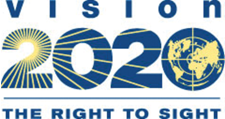
COMMENTS ARE WELCOME


